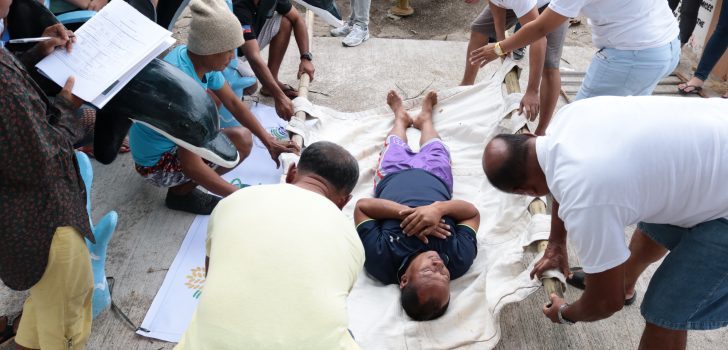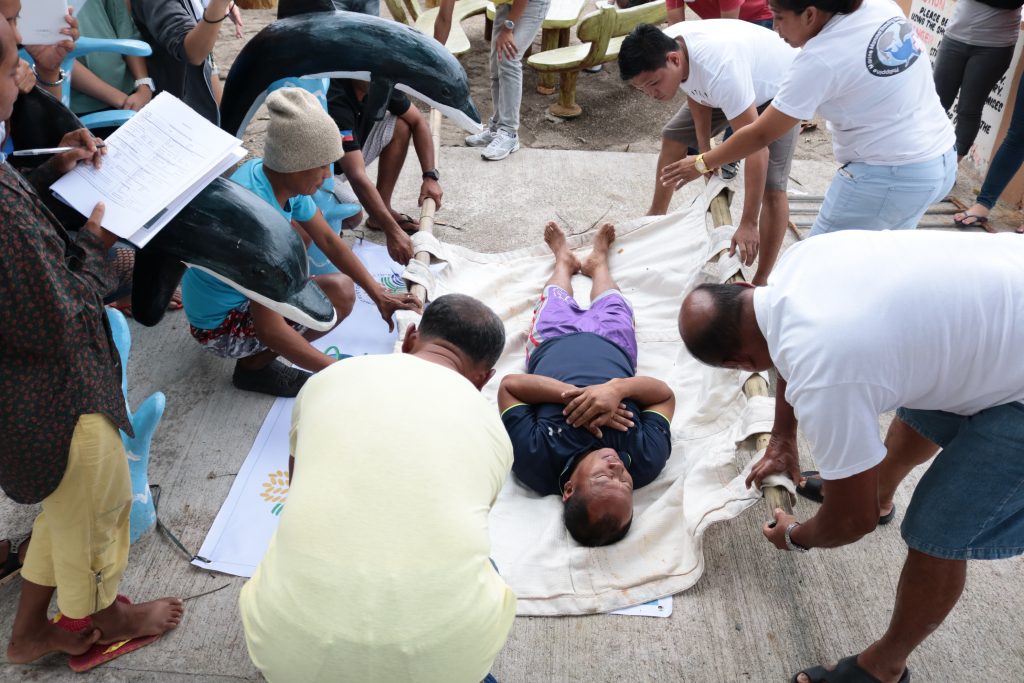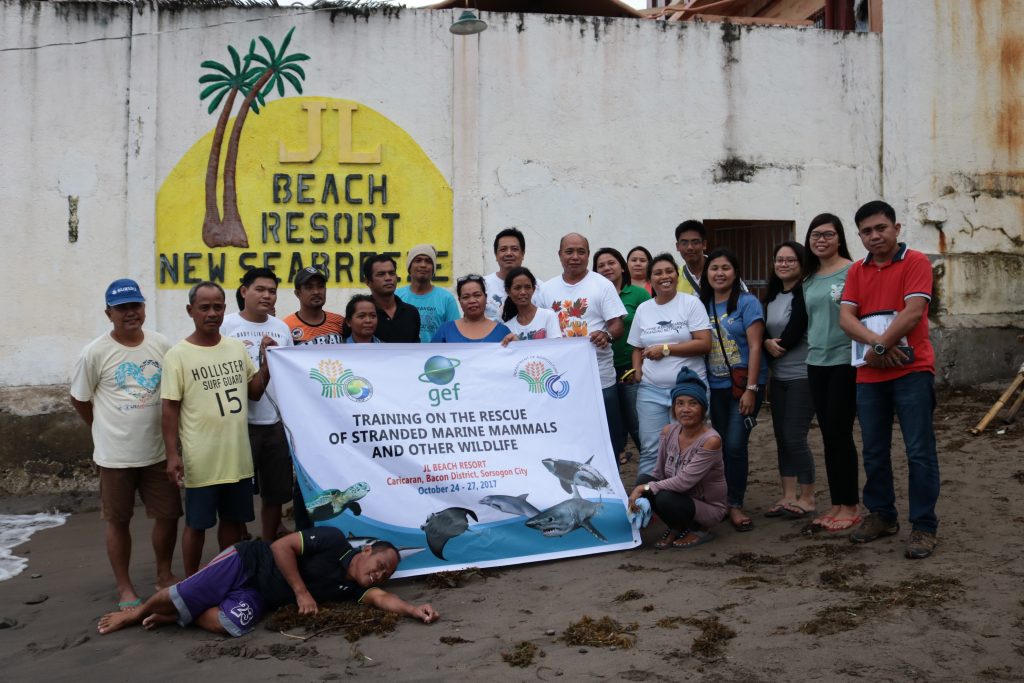 The participants of the Training on the Rescue of Stranded Marine Mammals and Other Wildlife enact the emergency first response handling and transportation of stranded marine mammals. (Photo by Ana Francesca Chavez)
The participants of the Training on the Rescue of Stranded Marine Mammals and Other Wildlife enact the emergency first response handling and transportation of stranded marine mammals. (Photo by Ana Francesca Chavez) PRDP Global Environment Facility subproject stakeholders trained on stranding marine mammal rescue
BACON, SORSOGON—When Editha Mingote was young, she thought that the slaughter of stranded marine mammals in Calintaan Island in Matnog, Sorsogon was acceptable. Now serving her term as president of the Samahan ng Kababaihang Sanktuwaryo ng Calintaan, Mingote realized that it was unethical and illegal.
Mingote was among the participants of the Training on the Rescue of Stranded Marine Mammals and Other Wildlife conducted by the Philippine Rural Development Project Global Environment Facility Unit (PRDP-GEF) on October 24–26, in this province.
Municipal Agriculturists, barangay officials, Bantay Dagat (Fish Wardens), law enforcers and representatives of the GEF subproject proponent groups in Pilar and Matnog in Sorsogon and Agdangan, Quezon participated in the training.
Bureau of Fisheries and Aquatic Resources (BFAR) Fishery Resource Management Section Chief Nonie Enolva defined stranding as the event when a marine mammal is on the beach in a helpless situation, caught in a net, or has lost capability to swim back to its normal habitat.
Reports from the Philippine Marine Mammal Stranding Network show that Bicol is one of the hotspot regions in the country in terms of marine mammal stranding. Among the species that commonly strand in the Philippines are the Spinner dolphin, pilot whale, melon-headed whale, Risso’s dolphin, dwarf sperm whale, and Fraser’s dolphin. Possible causes of marine mammal stranding include illness, malnutrition, natural toxins, and parasite. Other causes are physical injury or escape from predators, human-induced injuries, ingestion of trash, errors in navigation, and complex topography and weather conditions.
“Our goal when we respond to a live stranding is to save the animal,” Enolva said. “The rescue of a stranded cetacean [marine mammal] is a symbol of our effort to protect the ocean environment,” she added.
She also reiterated the national and international laws and regulations to protect marine mammals including the Wildlife Resources Conservation and Protection Act, and the Animal Welfare Act of 1998. The Fisheries Code of 1998 and the Convention on International Trade in Endangered Species of Wild Fauna and Flora (CITES) were also cited.
Enolva informed the participants about the stages in stranding events namely the first response, stranding team response, and the post-stranding response. She also discussed the stranding response process starting with a report of a stranding event, receiving the call and confirming the information, relaying instructions to first responders, responding to the stranded marine mammal, and notifying authorities and relevant parties.
Moreover, she presented the basic biology of marine mammals, the necessary medical care during the first response, and the rehabilitation, proper handling, and transport of stranded mammals and other marine wildlife.
Chito Morris, fishery technician and fish examiner at the Pilar Local Government Unit (LGU), said that the training was an enriching experience for the personnel of LGUs as PRDP’s Project partners.
“Malaking bagay para maipaliwanag sa mga coastal communities na kung minsan may nasasadsad na ganitong mga uri ng hayop ang kahalagahan ng mga marine mammals (This [training] is very significant in explaining to our coastal communities, where marine mammals are sometimes stranded, the importance of caring for the marine mammals),” he said.
The Training on the Rescue of Stranded Marine Mammals and Other Wildlife was initiated by the PRDP for GEF sites listed by the National Biodiversity Strategy and Action Plan (NBSAP) as priority conservation areas. The International Union for Conservation of Nature (IUCN), Conservation International (CI), and the Department of Environment and Natural Resources (DENR) cited the project sites as key marine biodiversity areas. The BFAR also recognized the sites as major coastal and fishery resource areas which possess globally threatened species.
The Donsol–Ticao–Burias Pass was identified as the PRDP-GEF site in Bicol. It covers marine protected areas (MPAs) in the municipalities of Magallanes, Matnog, Pilar, and Bulan in Sorsogon and the Municipality of San Fernando in Masbate. The project sites are sanctuaries to globally threatened species including whale shark Rhincodontypus, hammerhead sharks, and extensive coral reef, mangrove, and sea grass ecosystem. ### (Annielyn L. Baleza, DA-PRDP Bicol InfoACE Unit)

Bureau of Fisheries and Aquatic Resources (BFAR) Fishery Resource Management Section Chief Nonie Enolva delivers a lecture on the process of reporting a stranding marine mammal. This is during the Training on the Rescue of Stranded Marine Mammals and Other Wildlife conducted by the Philippine Rural Development Project Global Environment Facility Unit (PRDP-GEF) on October 24–26 in Bacon, Sorsogon. (Photo by Ana Francesca Chavez)

The participants of the Training on the Rescue of Stranded Marine Mammals and Other Wildlife enact the emergency first response handling and transportation of stranded marine mammals. (Photo by Ana Francesca Chavez)

The participants of the Training on the Rescue of Stranded Marine Mammals and Other Wildlife pose for a photo with Bureau of Fisheries and Aquatic Resources (BFAR) Fishery Resource Management Section Chief Nonie Enolva (standing, 6th from right), PRDP Project Support Office (PSO) Natural Resources Management (NRM) Unit Specialist Ferdinand Cruz (standing, 2nd row, 3rd from left) and other PRDP PSO and RPCO staff. (Photo by Ana Francesca Chavez)
